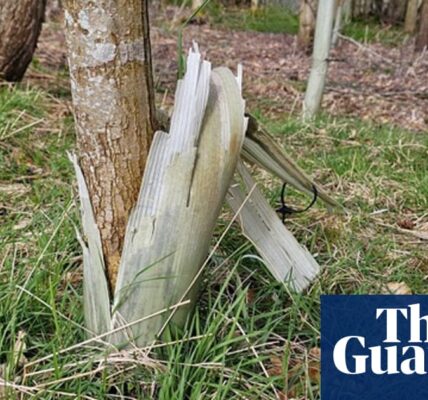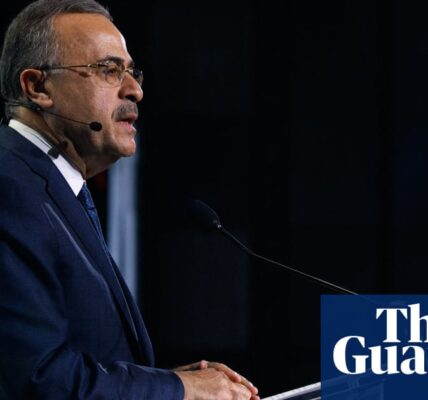The African group has issued a warning that Cop28 has not been successful in addressing climate adaptation finance.
The chief negotiator for the African group has cautioned that fair and just financial support for climate adaptation is crucial for the survival of the continent, yet discussions at Cop28 have not yielded positive results.
Adaptation is being discussed as part of the global stocktake (GST), the assessment of where the world is on delivering the commitments made in the 2015 Paris agreement. The long-awaited global goal on adaptation (GGA) – a collective commitment proposed by the African group in 2013 and established under the Paris agreement – to drive political action and finance for adaptation on the same scale as mitigation, is also due to be completed in Dubai.
Unfortunately, there has been limited advancement in this area and nations have not reached a consensus on specific goals and rules. Moreover, there has been no successful development of a practical structure and financial agreements that accurately consider the challenges faced by developing countries, particularly in Africa. It remains uncertain if the anticipated results will be achieved, as countries have not yet reached an agreement on the preliminary document.
Ephraim Mwepya Shitima, the leader of the African negotiators, emphasized the urgency of addressing the adaptation crisis and the impact it has on vulnerable communities. It is crucial for the world to take action and provide adequate funding to close the adaptation gap, ensuring that Africans are not left behind. This should be a top priority in the outcome of Cop28.
In Africa, adaptation is crucial for our survival. It is a matter of life and death. We require both action and financial support to adapt to the changing climate. Without it, we will struggle to handle the severe droughts, destructive storms, and rising sea levels that endanger our lives. Although we are disappointed by the lack of progress so far, we still have a few days left to make a positive impact.
Global leaders have recognized the “notable” shortfall in financial support for nationwide efforts to address the effects of climate change. According to a recent report by the United Nations, funding for adaptation projects should amount to $194-366 billion per year. However, the latest data shows that funding actually decreased by 15% in 2021 compared to the previous year, totaling $24.6 billion. The Organisation for Economic Co-operation and Development claims that the promise made by developed countries in 2009 to provide $100 billion for adaptation efforts has finally been fulfilled this year, more than ten years later. However, developing countries are calling for an independent evaluation of the data.
During the last days of talks, African nations are advocating for fairness and equality in the final resolutions on mitigation, adaptation, loss and damage, and implementation, all of which rely on climate finance.
The minister of lands and natural resources in Ghana, Samuel Abu Jinapor, stated that the main focus of discussions about finances should consider the historical background of the climate crisis, which was primarily caused by the Industrial Revolution. These economies that were developed are also the main culprits for emitting greenhouse gases. As we strive to develop our economies and attain the same level of prosperity as the global north, we must also take responsibility by reducing emissions and implementing measures to support global efforts in mitigating climate change.

Africa contributes 4% of the world’s greenhouse gas emissions and receives only 2% of funding for renewable energy.
Numerous countries possess significant reserves of fossil fuels, located on land or beneath the ocean floor, particularly in the continent with high development demands, debt, and limited access to funding. These resources, including oil, coal, and gas, are valuable assets that impact a country’s credit rating and ability to secure financing. As such, African representatives argue that requesting these nations to leave their fossil fuels untouched without compensation is unjust and biased.
According to Jinapor, certain forest communities in Ghana are being forced to find alternative sources of income instead of relying on cacao farming due to its contribution to deforestation. He emphasized the importance of fair financing for adaptation, mitigation, and addressing loss and damage caused by climate change. He also stated that it is crucial to create a new financial structure for climate financing instead of replicating the existing unequal global financial system.
African nations are advocating for inclusion of climate funding in the GST, along with broader changes to global financial systems that tend to benefit wealthier nations. Egypt’s chief negotiator, Mohamed Nasr, stated that the GST must tackle existing disparities and obstacles in financial flows. Without adequate funding for implementation, any rhetoric of phasing out or reducing reliance on fossil fuels will only be empty words, as countries will be unable to follow through.
The United States, United Kingdom, European Union, and fossil fuel companies are advocating for any mentions of phasing out or reducing the use of fossil fuels in the GST to be clarified as “unabated.” However, developing countries, particularly those in Africa, are raising concerns. Nasr stated, “Permitting ‘abated’ fossil fuels would benefit developed countries that have the resources for costly carbon capture technologies, while discriminating against developing countries that do not.”
African countries have actively participated in the Just Transition initiative, which was introduced at Cop27 in Egypt, advocating for a more comprehensive approach that links climate efforts and funding with sustainable development. However, this has been met with opposition from major economies such as the US, EU, UK, Canada, and Australia, according to information obtained by the Guardian.
According to Mohamed Adow, the director of Power Shift Africa, the top priority in Dubai should be eliminating the use of fossil fuels. While the growth of renewable energy sources is significant, it is only effective if it is approached with a focus on fairness and equality. By addressing these issues, there will be no resistance from the African group or least developed countries. However, it is crucial to include fairness for poorer nations in our language and actions.
Increasing renewable energy sources by three times does not necessarily guarantee a reduction in the use of fossil fuels. Therefore, it is important to also establish a specific date for phasing out the use of fossil fuels.
Source: theguardian.com


